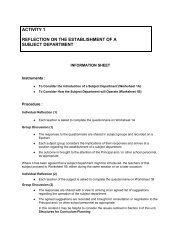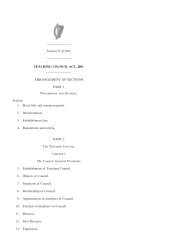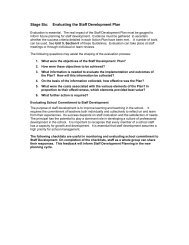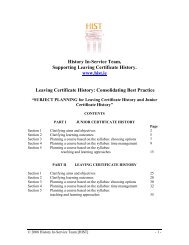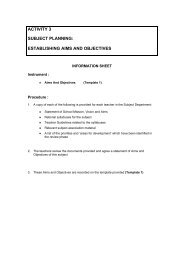Co-Operative School Evaluation Project (File Format PDF 550KB)
Co-Operative School Evaluation Project (File Format PDF 550KB)
Co-Operative School Evaluation Project (File Format PDF 550KB)
Create successful ePaper yourself
Turn your PDF publications into a flip-book with our unique Google optimized e-Paper software.
COOPERATIVE SCHOOL EVALUATION PROJECT<br />
EXECUTIVE SUMMARY<br />
Executive Summary<br />
The CSEP project proposed indicators for the development of non-curricular school policies in a school development<br />
planning context. At an international workshop involving experts from many countries from within the European<br />
Union, four primary indicators were identified.<br />
1. INFRASTRUCTURE: this indicator takes account of different national contexts, and the external and<br />
internal supports available to schools for involvement in planning.<br />
2. DESIGN: the focus of this indicator is on the process by which non-curricular policies are formulated. It<br />
examines the link between specific policies and the operational culture of the school; the level of<br />
collaboration between stakeholders in the process; and the specificity of targets and resource identification.<br />
3. IMPLEMENTATION: the focus of this indicator is on the way personnel are assigned to the implementation<br />
of the policy, the effectiveness of the monitoring process and the use of resources, as well as on the<br />
scope of implementation.<br />
4. IMPACT: this indicator examines the provision made for evaluating the impact of the policy during the<br />
planning process. It examines the criteria for evaluation, data collection, and the evaluation process.<br />
A number of sub-indicators were developed under each of these headings (Appendix 1).<br />
In collaboration with partners from Finland and Norway, the Irish Steering <strong>Co</strong>mmittee developed a set of<br />
instruments to test these indicators in schools. Two trials were conducted. At an initial trial, all partners focused on<br />
the development of anti-bullying policies in schools. In the main trial, five general non-curricular policy areas were<br />
addressed: the professional development of staff; legal requirements on schools; communications; student<br />
democracy; and partnership between school and community. Each partner agreed to examine three of these areas<br />
in the trial, which involved schools at primary and secondary levels.<br />
6<br />
7



